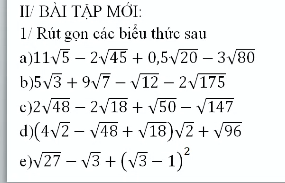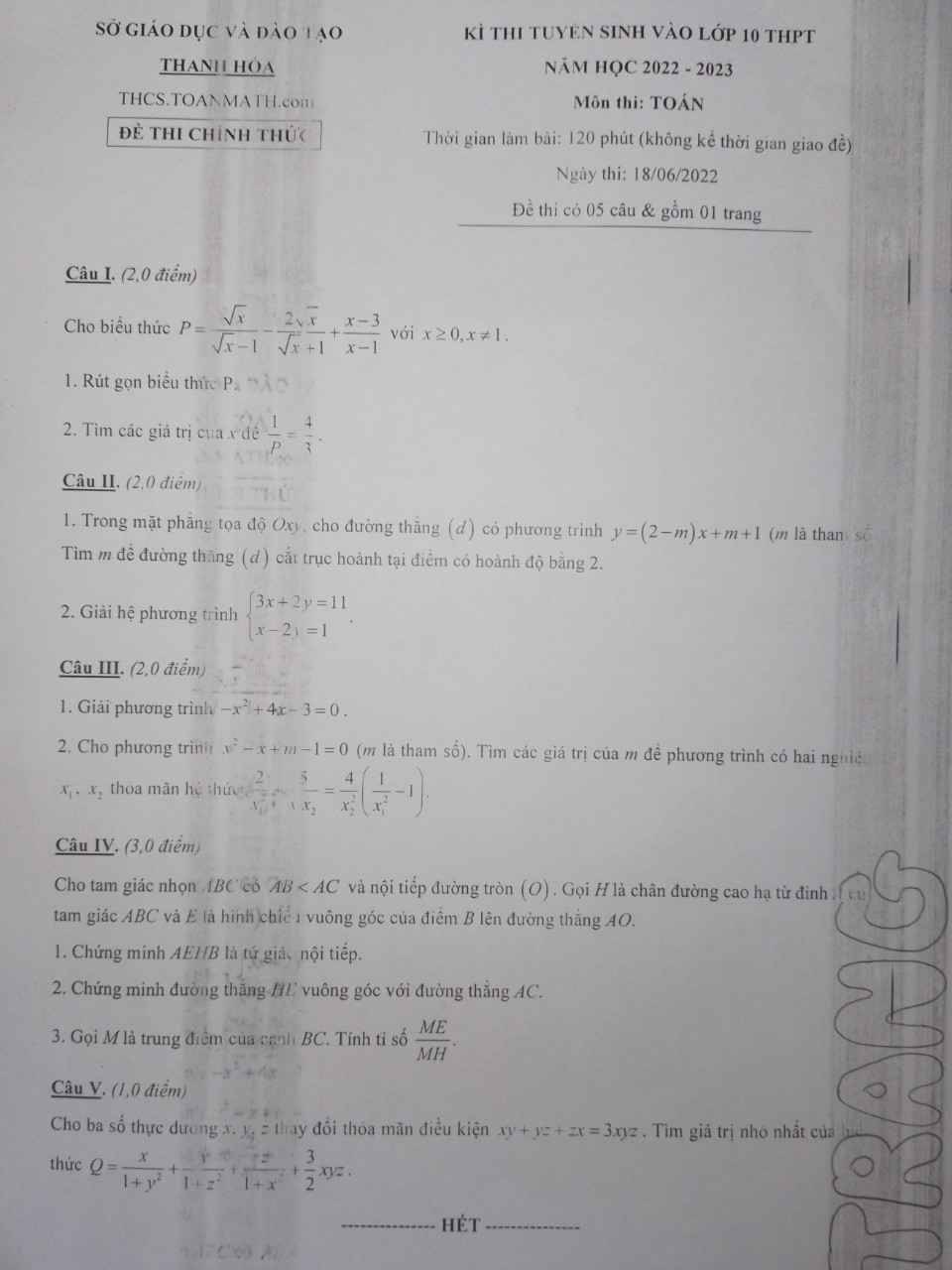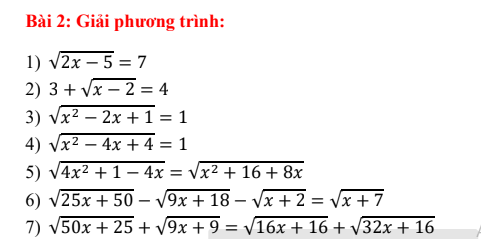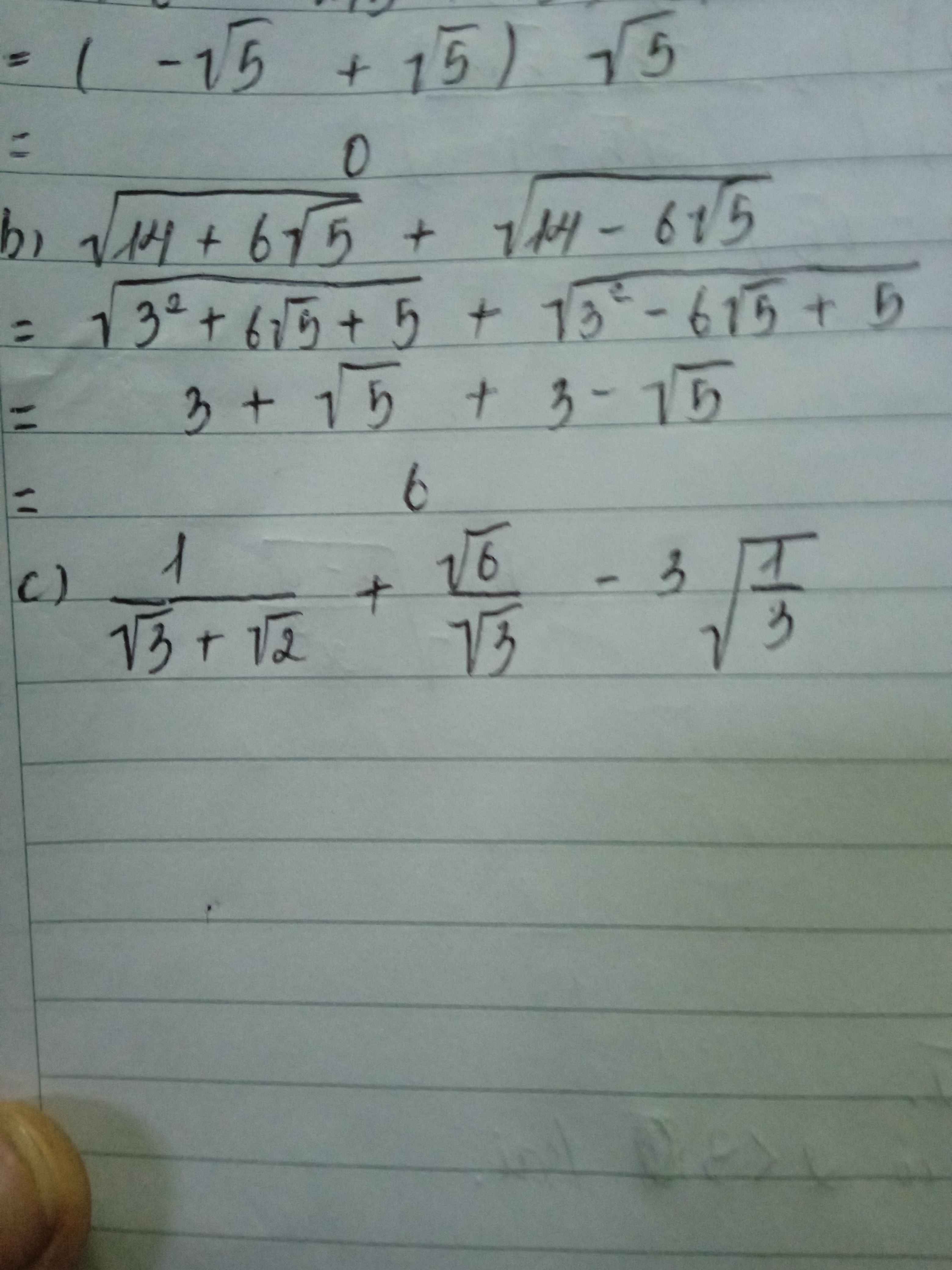
Hãy nhập câu hỏi của bạn vào đây, nếu là tài khoản VIP, bạn sẽ được ưu tiên trả lời.


\(VT=\sqrt{\dfrac{\sqrt{5}}{8\sqrt{5}+3\sqrt{35}}}.\left(3\sqrt{2}+\sqrt{14}\right)\)
\(=\sqrt{\dfrac{\sqrt{5}}{8\sqrt{5}+3\sqrt{5}.\sqrt{7}}}.\left(3\sqrt{2}+\sqrt{2}.\sqrt{7}\right)\)
\(=\sqrt{\dfrac{\sqrt{5}}{\sqrt{5}\left(8+3\sqrt{7}\right)}}.\left[\sqrt{2}\left(3+\sqrt{7}\right)\right]\)
\(=\sqrt{\dfrac{1}{8+3\sqrt{7}}}.\left[\sqrt{2}\left(3+\sqrt{7}\right)\right]\)
\(=\dfrac{\sqrt{2}\left(3+\sqrt{7}\right)}{\sqrt{8+3\sqrt{7}}}\)
\(=\dfrac{\sqrt{2}.\sqrt{2}\left(3+\sqrt{7}\right)}{\sqrt{2}.\sqrt{8+3\sqrt{7}}}\) (Nhân \(\sqrt{2}\) cả tử và mẫu)
\(=\dfrac{2\left(3+\sqrt{7}\right)}{\sqrt{16+6\sqrt{7}}}\)
\(=\dfrac{2\left(3+\sqrt{7}\right)}{\sqrt{\left(3+\sqrt{7}\right)^2}}\)
\(=\dfrac{2\left(3+\sqrt{7}\right)}{\left|3+\sqrt{7}\right|}\)
\(=\dfrac{2\left(3+\sqrt{7}\right)}{3+\sqrt{7}}\)
\(=2=VP\left(dpcm\right)\)

Câu I:
1. \(P=\dfrac{\sqrt{x}}{\sqrt{x}-1}-\dfrac{2\sqrt{x}}{\sqrt{x}+1}+\dfrac{x-3}{x-1}\left(x\ge0;x\ne1\right)\)
\(=\dfrac{\sqrt{x}\left(\sqrt{x}+1\right)}{x-1}-\dfrac{2\sqrt{x}\left(\sqrt{x}-1\right)}{x-1}+\dfrac{x-3}{x-1}\)
\(=\dfrac{x+\sqrt{x}-2x+2\sqrt{x}+x-3}{x-1}\)
\(=\dfrac{3\sqrt{x}-3}{x-1}=\dfrac{3\left(\sqrt{x}-1\right)}{\left(\sqrt{x}+1\right)\left(\sqrt{x}-1\right)}=\dfrac{3}{\sqrt{x}+1}\)
2. \(\dfrac{1}{P}=\dfrac{4}{3}\)
\(\Leftrightarrow\dfrac{1}{\dfrac{3}{\sqrt{x}+1}}=\dfrac{4}{3}\)
\(\Leftrightarrow\dfrac{12}{\sqrt{x}+1}=3\)
\(\Leftrightarrow3\sqrt{x}+3=12\)
\(\Leftrightarrow\sqrt{x}=3\)
\(\Leftrightarrow x=9\left(Vì.x\ge0;x\ne1\right)\)
Câu II:
1. Vì đường thẳng (d) cắt trục hoành tại điểm có hoành độ bằng 2, nên đường thẳng (d) cắt trục hoành tại điểm có tọa độ (2;0)
Thay x = 2; y = 0 vào phương trình đường thẳng (d), ta được:
\(0=\left(2-m\right).2+m+1\)
\(\Leftrightarrow4-2m+m+1=0\)
\(\Leftrightarrow-m=-5\)
\(\Leftrightarrow m=5\)
Vậy nếu m = 5 thì đưởng thẳng (d) cắt trục hoành tại điểm có hoành độ bằng 2.
2. \(\left\{{}\begin{matrix}3x+2y=11\\x-2y=1\end{matrix}\right.\Leftrightarrow\left\{{}\begin{matrix}4x=12\\x-2y=1\end{matrix}\right.\Leftrightarrow\left\{{}\begin{matrix}x=3\\3-2y=1\end{matrix}\right.\Leftrightarrow\left\{{}\begin{matrix}x=3\\y=1\end{matrix}\right.\)
Vậy hệ phương trình có nghiệm duy nhất là (x; y) = (3; 1)

1) \(\sqrt{2x-5}=7\)
\(\left(\sqrt{2x-5}\right)^2=7^2\)
\(2x-5=49\)
\(2x=54\)
\(x=27\)
2) \(3+\sqrt{x-2}=4\)
\(\sqrt{x-2}=1\)
\(\left(\sqrt{x-2}\right)^2=1^2\)
\(x-2=1\)
\(x=3\)
1) \(\sqrt{2x-5}=7\left(đk:x\ge\dfrac{5}{2}\right)\)
\(\Leftrightarrow2x-5=49\Leftrightarrow2x=54\Leftrightarrow x=27\left(tm\right)\)
2) \(3+\sqrt{x-2}=4\left(đk:x\ge2\right)\)
\(\Leftrightarrow\sqrt{x-2}=1\Leftrightarrow x-2=1\Leftrightarrow x=3\)
3) \(\Leftrightarrow\sqrt{\left(x-1\right)^2}=1\Leftrightarrow\left|x-1\right|=1\)
\(\Leftrightarrow\left[{}\begin{matrix}x-1=1\\x-1=-1\end{matrix}\right.\)\(\Leftrightarrow\left[{}\begin{matrix}x=2\\x=0\end{matrix}\right.\)
4) \(\Leftrightarrow\sqrt{\left(x-2\right)^2}=1\Leftrightarrow\left|x-2\right|=1\)
\(\Leftrightarrow\left[{}\begin{matrix}x-2=1\\x-2=-1\end{matrix}\right.\)\(\Leftrightarrow\left[{}\begin{matrix}x=3\\x=1\end{matrix}\right.\)
5) \(\Leftrightarrow\sqrt{\left(2x-1\right)^2}=\sqrt{\left(x+4\right)^2}\)
\(\Leftrightarrow\left|2x-1\right|=\left|x+4\right|\)
\(\Leftrightarrow\left[{}\begin{matrix}2x-1=x+4\\2x-1=-x-4\end{matrix}\right.\)\(\Leftrightarrow\left[{}\begin{matrix}x=5\\x=-1\end{matrix}\right.\)
6) \(ĐK:x\ge-2\)
\(\Leftrightarrow5\sqrt{x+2}-3\sqrt{x+2}-\sqrt{x+2}=\sqrt{x+7}\)
\(\Leftrightarrow\sqrt{x+2}=\sqrt{x+7}\)
\(\Leftrightarrow x+2=x+7\Leftrightarrow2=7\left(VLý\right)\)
Vậy \(S=\varnothing\)
7) \(ĐK:x\ge-1\)
\(\Leftrightarrow5\sqrt{2x+1}+3\sqrt{x+1}=4\sqrt{x+1}+4\sqrt{2x+1}\)
\(\Leftrightarrow\sqrt{2x+1}=\sqrt{x+1}\)
\(\Leftrightarrow2x+1=x+1\Leftrightarrow x=0\left(tm\right)\)

Bài 2
a, bạn tự vẽ
b, Hoành độ giao điểm tm pt
\(2x^2-2x+3=0\)
\(\Delta'=1-3.2=-5< 0\)
Vậy pt vô nghiệm hay (d) ko cắt (P)


c) Ta có: \(\dfrac{1}{\sqrt{3}+\sqrt{2}}+\dfrac{\sqrt{6}}{\sqrt{3}}-3\cdot\sqrt{\dfrac{1}{3}}\)
\(=\sqrt{3}-\sqrt{2}+\sqrt{2}-\sqrt{3}\)
=0

1: Khi x=3-2 căn 2 thì \(A=\dfrac{\sqrt{2}-1+2}{\sqrt{2}-1}=\dfrac{\sqrt{2}+1}{\sqrt{2}-1}=3+2\sqrt{2}\)
2: \(B=\dfrac{x+\sqrt{x}+2+\sqrt{x}-2}{x-4}=\dfrac{x+2\sqrt{x}}{x-4}=\dfrac{\sqrt{x}}{\sqrt{x}-2}\)
3: \(P=A:B=\dfrac{\sqrt{x}+2}{\sqrt{x}}:\dfrac{\sqrt{x}}{\sqrt{x}-2}=\dfrac{x-4}{x}\)
\(x\cdot P< =10\sqrt{x}-29-\sqrt{x-25}\)
=>\(x-4< =10\sqrt{x}-29-\sqrt{x-25}\)
\(\Leftrightarrow x-4-10\sqrt{x}+29< =-\sqrt{x-25}\)
=>\(x-10\sqrt{x}+25< =-\sqrt{x-25}\)
=>(căn x-5)^2<=-căn x-25
=>x-25=0
=>x=25









\(a,=11\sqrt{5}-6\sqrt{5}+\sqrt{5}-12\sqrt{5}=-2\sqrt{5}\\ b,=5\sqrt{3}+9\sqrt{7}-2\sqrt{3}-10\sqrt{7}=3\sqrt{3}-\sqrt{7}\\ c,=8\sqrt{3}-6\sqrt{2}+5\sqrt{2}-7\sqrt{3}=\sqrt{3}-\sqrt{2}\\ d,=\left(4\sqrt{2}-4\sqrt{3}+3\sqrt{2}\right)\sqrt{2}+4\sqrt{6}\\ =\left(7\sqrt{2}-4\sqrt{3}\right)\sqrt{2}+4\sqrt{6}=14-4\sqrt{6}+4\sqrt{6}=14\)